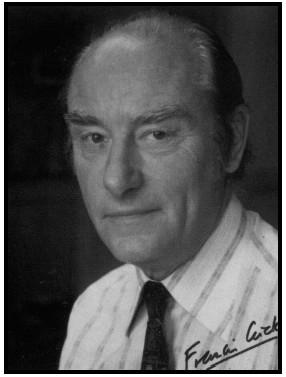Obituary

Francis Harry Compton Crick
1916-2004
On July 28th 2004, Francis Crick died in San Diego, California. The world lost an ingenious scientist and outstanding thinker, the impact of which into progress of civilization is invaluable. In 1962, he together with J. Watson and M. Wilkins was awarded the Nobel Prize for discovery of the DNA double helix. The particular DNA model suggested embodied unique data of E. Chargaff and R. Franklin and explained finally, how inheritable properties of organism are transmitted from cell to cell; due to it the main principle of genetics, heredity, was finally materialized and became clear. The results of Crick's subsequent very fruitful investigations amaze also with the accuracy of thought and unique scientific prediction. He suggested the famous adaptor theory describing the necessity and role of mediator (tRNA) in translation from nucleotide language of nucleic acids into amino acid language of proteins; his well known wobble hypothesis explained how degeneracy of genetic code is realized. Together with other Nobel Laureate S. Brenner, he discovered the main properties of the genetic code; he described the principles of organization of small spherical viruses and suggested a theory of DNA supertwisting in chromatin; together with A. Rich, D. Davies, and J. Watson he suggested the structure of collagen.
The discovery of the DNA double helix structure and Crick's subsequent fundamental observations started the triumphant and stunning march of the science that touched and transformed practically all aspects of modern life: due to these discoveries new very stimulating knowledge and even entire disciplines have appeared (genomics, proteomics, bioengineering, bioinformatics, genosystematics, epigenetics, and others). During the last years of his life (at Salk Institute, La Jolla, California) Francis Crick was engaged in the study of the nature of thought and looked for ways helping to decipher how the process of thinking is associated with organization of brain structures; it was an attempt to understand and explain how “each of us represents, in fact, a complex behavior of the sets of the interacting neurons”. Being an outstanding theoretician, he evaluated experiment very highly saying that one proper brilliant experiment may deserve many theories. He was an outstanding popularizer of science and an author of a few captivating books on molecular biology and the nature of thought.
Extremely powerful intellect, real curiosity, and a very fine sense of humor were special characteristics of his personality; he was very attentive and critical to his own friends and colleagues and very careful in his thoughts, clothing, and even haircut. He did not like mysticism and religion very much.
Francis Crick was born in Northampton (England) on June 8, 1916. He was educated at Northampton Grammar School, Mill Hill School, and University College, London from which he graduated in 1937. His investigations there in physics were interrupted by the Second World War when he transferred to the Admiralty, designing magnetic and acoustic mines. After the war his attention was drawn to molecular biology that he considered as a boundary between living and non-living. In 1947, he started his trial way to biology in Cambridge in Strangeways Laboratory and then in Cavendish Laboratory of Cambridge University (1949). In 1950 he became the Member of Caius College, Cambridge, and obtained a Ph.D. in 1954 with a thesis entitled “X-Ray Diffraction: Polypeptides and Proteins”. In 1953 together with J. Watson, he published in Nature his famous article on DNA structure that, in fact, was a beginning of Molecular Biology itself. Recently all of us celebrated the 50th Anniversary of this remarkable event.
Crick was made an F. R. S. in 1959. Along with the Nobel Prize, he was awarded the Prix Charles Leopold Meyer of the French Academy of Sciences in 1961, and the Award of Merit of the Gairdner Foundation in 1962. Together with J. D. Watson, he was a Warren Triennial Prize Lecturer in 1959 and received a Research Corporation Award in 1962. With J. D. Watson and M. H. F. Wilkins, he was presented with a Lasker Foundation Award in 1960. In 1962 he was elected a Foreign Honorary Member of the American Academy of Arts and Sciences and a Fellow of University College, London. He was a Fellow of Churchill College, Cambridge, in 1960-1961, and a non-resident Fellow of the Salk Institute for Biological Studies, San Diego, California.
We new him very well here in Russia and he paid us generously with his attention and respect to Russian science.
Francis Crick was a whole epoch in biology and the beginning of its molecular branch. He was always ahead of time--unfortunately, now time is ahead of him...
B. F. Vanyushin